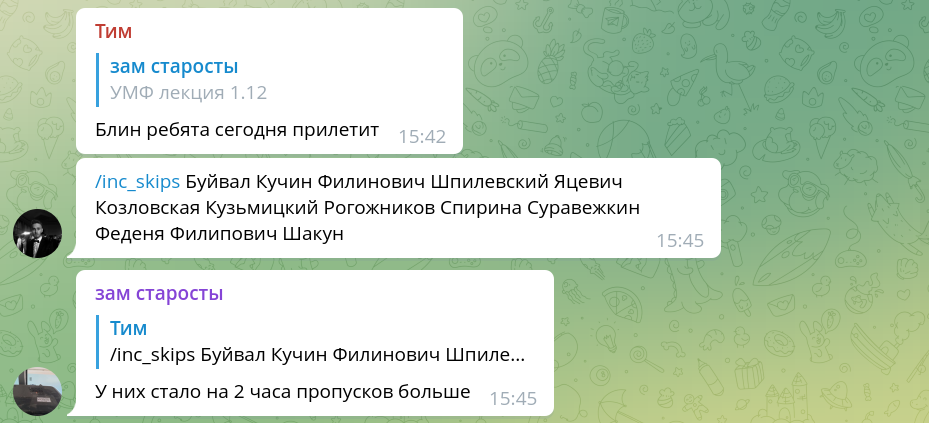What can this bot do?
Skip-tracking features
-
get skips of one user

-
get skips of all users

-
(admin only) set skips of one user

-
(admin only) increment skips for many users (by last names)

Poll features
-
tag users who didn't vote

-
print poll stats (
/statscommand) -
order voters by last name (built-in for all commands)
-
(admin only) create polls
just send poll to bot: it will create a copy of poll, send it to group chat and pin it

-
(akim only) create schedule and send polls every week automatically
Timetable features
Greeting features
Queue features
-
get queues list

-
get users list in queue

-
sign-up to queue

-
sign-up to particular place in queue (if it's free)

-
change position in queue

-
leave queue

-
leave queue and decrement queue positions

-
(admin only) add queue

-
(admin only) clear queue

-
(admin only) remove queue

-
(admin only) kick first user from queue and shift

How to test the bot locally?
- Install PostgreSQL: https://www.postgresql.org/download/.
- Create user
postgreswith passwordpostgres(to use other credentials, editsettings.py). - Create
dma_bmi_testdatabase withpublicschema in it. - Run the following script:
create sequence queue_id_seq
as integer;
create sequence user_queue_id_seq
as integer;
create sequence poll_option_id_seq
as integer;
create sequence user_vote_id_seq
as integer;
create table departments
(
id integer not null
constraint department_pk
primary key,
chat_id integer,
name text
);
create table polls
(
id char(50) not null
constraint poll_pk
primary key,
department_id integer
constraint poll_department_id_fk
references departments
on update cascade on delete cascade,
question text,
created_at timestamp
);
create table users
(
id integer not null
constraint user_pk
primary key,
first_name text,
last_name varchar(20),
department_id integer
constraint user_department_id_fk
references departments
on update cascade on delete cascade,
sub_department char(3),
is_admin smallint,
skips_month integer,
skips_semester integer,
birthday timestamp
);
create unique index user_last_name_uindex
on users (last_name);
create table queues
(
id integer default nextval('queue_id_seq'::regclass) not null
constraint queue_pk
primary key,
department_id integer
constraint queue_department_id_fk
references departments
on update cascade on delete cascade,
name text,
is_last smallint
);
alter sequence queue_id_seq owned by queues.id;
create table scheduled_polls
(
id integer not null
constraint poll_schedule_pk
primary key,
department_id integer
constraint poll_schedule_department_id_fk
references departments
on update cascade on delete cascade,
question text,
is_multi smallint,
weekday char(9),
utc_time timestamp
);
create table poll_options
(
id integer default nextval('poll_option_id_seq'::regclass) not null
constraint poll_option_pk
primary key,
poll_id char(50)
constraint poll_option_poll_id_fk
references polls
on update cascade on delete cascade,
text text
);
alter sequence poll_option_id_seq owned by poll_options.id;
create table queue_positions
(
id integer default nextval('user_queue_id_seq'::regclass) not null
constraint user_queue_pk
primary key,
user_id integer
constraint user_queue_user_id_fk
references users
on update cascade on delete cascade,
queue_id integer
constraint user_queue_queue_id_fk
references queues
on update cascade on delete cascade,
position integer
);
alter sequence user_queue_id_seq owned by queue_positions.id;
create table users_poll_options
(
id integer default nextval('user_vote_id_seq'::regclass) not null
constraint user_vote_pk
primary key,
user_id integer
constraint user_vote_user_id_fk
references users
on update cascade on delete cascade,
option_id integer
constraint user_vote_poll_option_id_fk
references poll_options
on update cascade on delete cascade
);
alter sequence user_vote_id_seq owned by users_poll_options.id;
create table timetables
(
id serial
constraint timetables_pk
primary key,
department_id integer
constraint timetables_departments_id_fk
references departments
on update cascade on delete cascade,
sub_department varchar(255) default NULL::character varying,
weekday varchar(255),
start_time time,
subject varchar(255),
auditory varchar(255),
type char
);- Fill database with some test data.
We recommend adding your Telegram id to
departmentstable inchat_idfield. This allows you to test all commands within your own bot chat.
- Run the following command
python __main__.pyBy default, script uses https://t.me/famcs_timetable_bot for tests, but you can change bot token in
settings.pyand use your own bot.
- Press
startin bot chat and enjoy!










